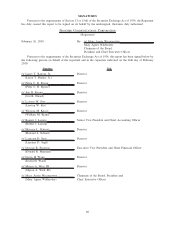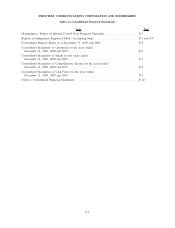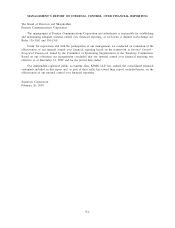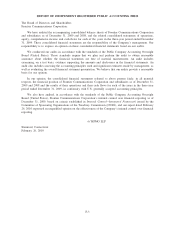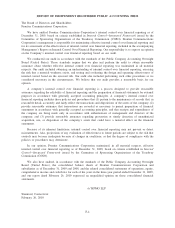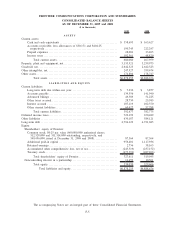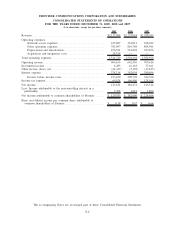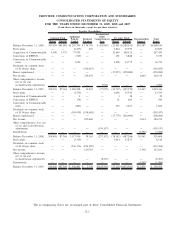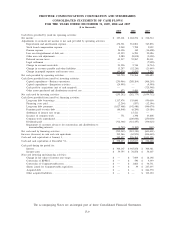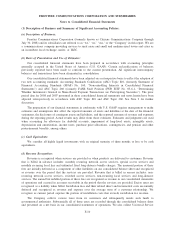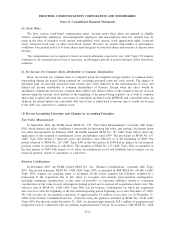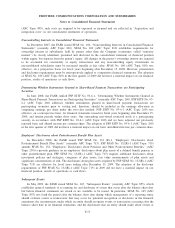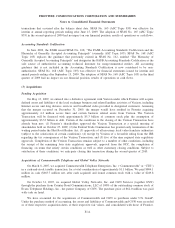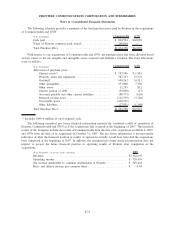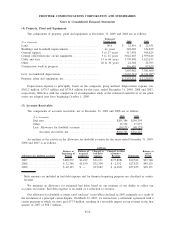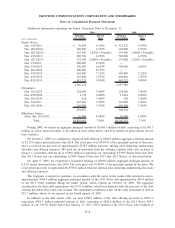Frontier Communications 2009 Annual Report Download - page 72
Download and view the complete annual report
Please find page 72 of the 2009 Frontier Communications annual report below. You can navigate through the pages in the report by either clicking on the pages listed below, or by using the keyword search tool below to find specific information within the annual report.(1) Description of Business and Summary of Significant Accounting Policies:
(a) Description of Business:
Frontier Communications Corporation (formerly known as Citizens Communications Company through
July 30, 2008) and its subsidiaries are referred to as “we,” “us,” “our,” or the “Company” in this report. We are
a communications company providing services to rural areas and small and medium-sized towns and cities as
an incumbent local exchange carrier, or ILEC.
(b) Basis of Presentation and Use of Estimates:
Our consolidated financial statements have been prepared in accordance with accounting principles
generally accepted in the United States of America (U.S. GAAP). Certain reclassifications of balances
previously reported have been made to conform to the current presentation. All significant intercompany
balances and transactions have been eliminated in consolidation.
Our consolidated financial statements have been adjusted on a retrospective basis to reflect the adoption of
two new accounting standards: Accounting Standards Codification (ASC) Topic 810, (formerly Statement of
Financial Accounting Standards (SFAS) No. 160, “Noncontrolling Interests in Consolidated Financial
Statements”) and ASC Topic 260 (formerly FASB Staff Position (FSP) EITF No. 03-6-1, “Determining
Whether Instruments Granted in Share-Based Payment Transactions are Participating Securities”). The prior
period data for 2008 and 2007 presented in these consolidated financial statements and notes herein have been
adjusted retrospectively in accordance with ASC Topic 810 and ASC Topic 260. See Note 2 for further
discussion.
The preparation of our financial statements in conformity with U.S. GAAP requires management to make
estimates and assumptions that affect the reported amounts of assets and liabilities at the date of the financial
statements, the disclosure of contingent assets and liabilities, and the reported amounts of revenue and expenses
during the reporting period. Actual results may differ from those estimates. Estimates and judgments are used
when accounting for allowance for doubtful accounts, impairment of long-lived assets, intangible assets,
depreciation and amortization, income taxes, purchase price allocations, contingencies, and pension and other
postretirement benefits, among others.
(c) Cash Equivalents:
We consider all highly liquid investments with an original maturity of three months or less to be cash
equivalents.
(d) Revenue Recognition:
Revenue is recognized when services are provided or when products are delivered to customers. Revenue
that is billed in advance includes: monthly recurring network access services, special access services and
monthly recurring local line and unlimited fixed long-distance bundle charges. The unearned portion of these
fees are initially deferred as a component of other liabilities on our consolidated balance sheet and recognized
as revenue over the period that the services are provided. Revenue that is billed in arrears includes: non-
recurring network access services, switched access services, non-recurring local services and long-distance
services. The earned but unbilled portion of these fees are recognized as revenue in our consolidated statements
of operations and accrued in accounts receivable in the period that the services are provided. Excise taxes are
recognized as a liability when billed. Installation fees and their related direct and incremental costs are initially
deferred and recognized as revenue and expense over the average term of a customer relationship. We
recognize as current period expense the portion of installation costs that exceeds installation fee revenue.
The Company collects various taxes from its customers and subsequently remits such funds to
governmental authorities. Substantially all of these taxes are recorded through the consolidated balance sheet
and presented on a net basis in our consolidated statements of operations. We also collect Universal Service
F-10
FRONTIER COMMUNICATIONS CORPORATION AND SUBSIDIARIES
Notes to Consolidated Financial Statements


